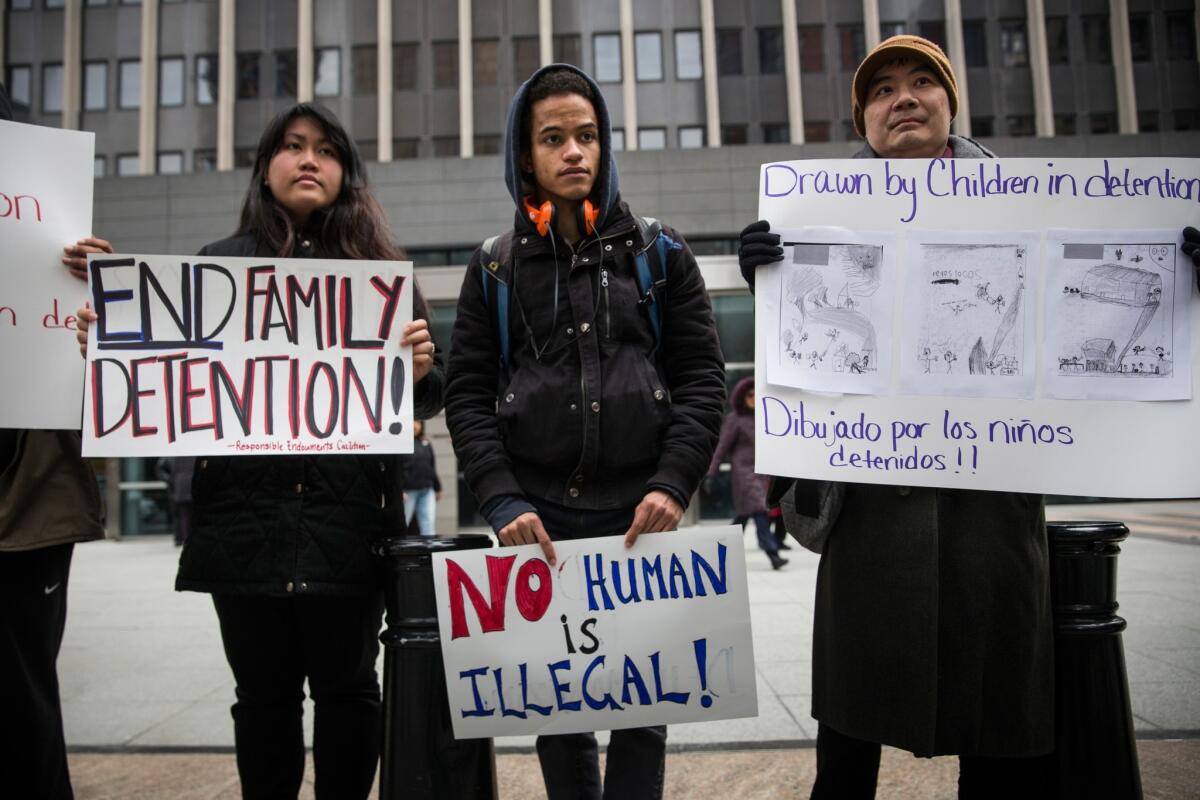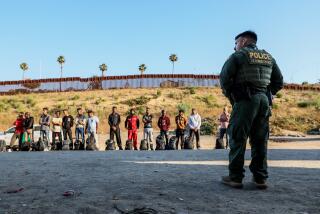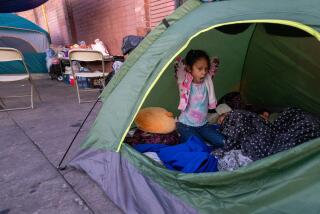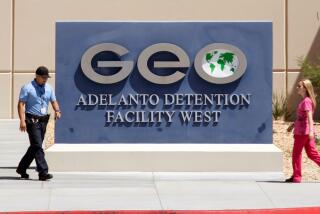Q&A: Immigrant on detention center hunger strike: ‘We want to be free’

Activists protest outside the Jacob K. Javits Federal Building in New York in March to demand the release of families held in detention centers in Texas.
Delmy Cruz left her son Alexis with her mother in Honduras and crossed the border illegally to make a life for herself cleaning homes in Los Angeles. Soon after, she gave birth to another son, Jackson, now 6.
Last year, as gang violence worsened in Honduras, Cruz returned home to bring Alexis, now 11, north. They crossed the border illegally in September near Hidalgo, Texas, and turned themselves in to U.S. Customs and Border Protection agents, hoping to win asylum. Border Patrol held them for a couple days before turning them over to U.S. Immigration and Customs Enforcement.
The pair have been held without bond ever since at one of three family detention centers nationwide, the Karnes County Residential Center, about 55 miles south of San Antonio. The facility has drawn criticism from immigrant advocates, who sued last fall alleging women detained there had been sexually assaulted by staff members -- an allegation that was unsubstantiated, according to a Homeland Security inspector general’s report in February.
Last month, a federal judge ruled against ICE’s practice of setting high bonds to keep women such as Cruz, 36, locked up during their immigration cases (Cruz and Alexis have yet to be released on bond). The American Civil Liberties Union had sued on behalf of asylum-seeking mothers who fled violence in Central America and were detained even after they were found by a U.S. immigration officer or judge to have a “credible fear” of persecution back home. The ACLU argued the women were detained partly as a deterrent to others who would cross the border illegally.
Last week, ICE Director Sarah Saldaña visited the Karnes facility and also addressed a congressional committee that grilled her about family detention conditions and a hunger strike at Karnes.
Earlier this month, Cruz and about three dozen other mothers in Karnes began the hunger strike to demand better conditions at the facility, subsisting on only water for about a week, then fasting with just one meal a day for another week. Their latest fast ended Tuesday. She talked by phone with the Los Angeles Times from the detention center about their reasoning for the strike.
Where are you from?
I’m from a village, La Colmena, in the state of Copán.
What did your parents do?
They raised corn and beans.
What was the last grade you completed in school?
Third grade.
Do you have relatives in the United States?
I have two sisters in Los Angeles and then there’s two others back in Honduras.
Why and when did you come to the United States?
I needed help. My ex-boyfriend would rape me any time he wanted, and he would hit me. Thank God I was able to arrive at Los Angeles in 2007.
Were you deported?
That same year. And I came back in 2007. I was cleaning houses, I found a woman to give me work. In 2008, my son was born in Los Angeles, Jackson.
Why did you go back to Honduras last year?
Because -- my mother wouldn’t tell me any of this -- but they were trying to recruit Alexis into a gang. A friend of Alexis got killed by a gang and that’s when I found out they were trying to recruit him.
Why not send for your son?
I didn’t want anything bad to happen to him during the trip. I thought it would be better for him if I was there. I wanted to do the right thing.
How did you return to the United States?
We crossed on the river on a raft, an inflatable raft.
Then you turned yourselves in to Border Patrol?
Yes.
What were conditions like where they initially detained you?
I was in the hielera [freezer, a nickname for Border Patrol holding cells] for two days and from there I was sent to Karnes. We were sleeping on the floor. They didn’t give us any blankets.
What have conditions been like at the Karnes facility?
Horrible. I don’t know what else to say about the place. Especially for the kids, they’re just suffering in here.
Did anything change after the federal judge’s decision last month directing ICE to grant reasonable bonds?
I didn’t understand [the ruling]. I had a finding of reasonable fear [during an ICE asylum interview]. My son had a finding of credible fear. The judge had joined our cases. So I don’t know if I’m going to get a bond or my own recognizance. At my last court appearance, my attorney asked for more time to prepare an application for my son.
Why did you decide to do a hunger strike?
Because of the injustices that are happening to kids inside. We want to be free, especially for our kids. We’re not going to stop until the last mother is free.
Do you want to be released on bond?
Yes. Especially after all the time I’ve been here, I feel they should release me on my own recognizance. Because I will follow the law and pursue my case in court.
What would you tell people who think that if you’re released, you’ll just disappear and not show up for court?
I will keep fighting for my case. I’ve lived here eight years and I’ve done everything according to the law. I filed my taxes to show the government that, and I haven’t broken any laws.
You started the hunger strike, then stopped, then restarted it -- why?
We want freedom for us and our children. We want to give [ICE] a chance to respond to us, and if not, then we will start again.
Are the children hunger striking or just the mothers?
Just the mothers.
Are you worried about how your son Alexis is faring in detention?
Yes. I left with him traumatized in Honduras by what happened to him. But now he’s locked up and more traumatized.
What would you tell people who say if you worried about your son, you should not have brought him on such a dangerous journey?
I’m here fighting for my children. And I know people were deported yesterday with their kids and the children were crying. We came here because we feared going back to our country.
I didn’t want to make the journey. I had to walk through the desert with my son. I was fighting for someone to help me. God gave me the opportunity.
What about people who say you should have immigrated legally?
You really can’t do it. I know that some people have applied for visas and they get denied. Other people don’t have money to apply for visas, so this is the only option they have.
Could you afford an attorney?
No. I have a [pro bono] attorney.
What do you want people to know about how women and children are held in detention?
I want them to know all the injustices that are happening inside. We want help, we want protection. We came here looking for help and instead they’re just detaining us.
Where is the rest of your family and do you talk to them? What about your younger son in Los Angeles?
He lives with his dad, but he works all day. He has a baby-sitter who takes him to school and picks him up. I talk to him sometimes, but there’s not much communication.
For the first three months I have been here, his grades have been dropping in class. Teachers have sent notes home about it. He’s crying about not being able to see me.
Has he visited?
No.
Are you allowed visitors?
Yes. But it’s too far and there’s no one who can bring him over here.
I want to get back as fast as possible because of my son waiting for me in Los Angeles. I don’t want to keep seeing the children detained inside.
Where I live there are small children -- 2, 3 years old. There’s a girl called Andrea. ... She doesn’t want to sleep, she looks depressed. She came here as a baby and she learned how to walk inside.
Twitter: @mollyhf
More to Read
Sign up for Essential California
The most important California stories and recommendations in your inbox every morning.
You may occasionally receive promotional content from the Los Angeles Times.











